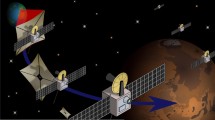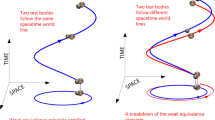Abstract
IN a recent article Marx1 examined the possibility that interstellar travel may be accomplished in the lifetime of an astronaut. He pointed out that the attainment of relativistic velocities by a rocket-propelled vehicle is hampered by the low efficiency, which is a result of the energy acquired by the ejected mass. Marx suggested that if an interstellar vehicle were driven by the pressure exerted on it by a light beam transmitted from the Earth, then, because the recoil momentum and energy would now be acquired by an extremely massive body—the Earth—the energy wasted would be negligible.
This is a preview of subscription content, access via your institution
Access options
Subscribe to this journal
Receive 51 print issues and online access
$199.00 per year
only $3.90 per issue
Buy this article
- Purchase on Springer Link
- Instant access to full article PDF
Prices may be subject to local taxes which are calculated during checkout
Similar content being viewed by others
References
Marx, G., Nature, 211, 22 (1966).
Author information
Authors and Affiliations
Rights and permissions
About this article
Cite this article
REDDING, J. Interstellar Vehicle propelled by Terrestrial Laser Beam. Nature 213, 588–589 (1967). https://doi.org/10.1038/213588a0
Received:
Revised:
Published:
Issue Date:
DOI: https://doi.org/10.1038/213588a0
This article is cited by
-
Self-stabilizing photonic levitation and propulsion of nanostructured macroscopic objects
Nature Photonics (2019)
Comments
By submitting a comment you agree to abide by our Terms and Community Guidelines. If you find something abusive or that does not comply with our terms or guidelines please flag it as inappropriate.



